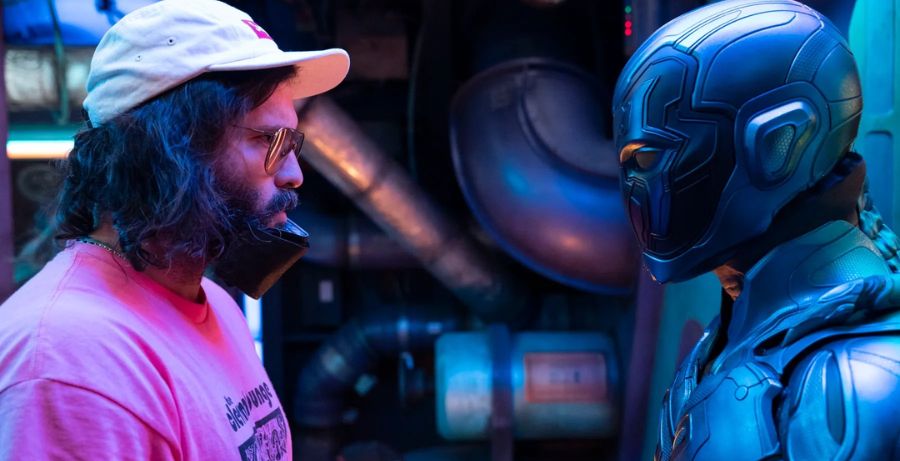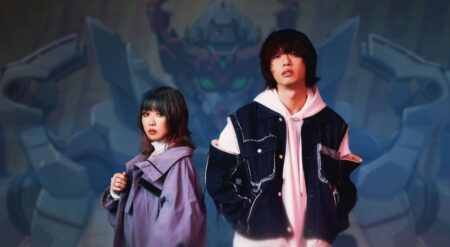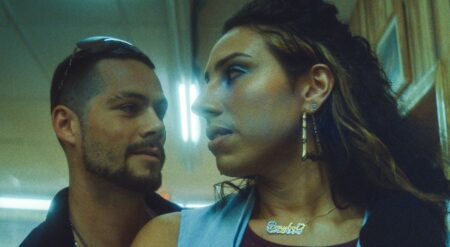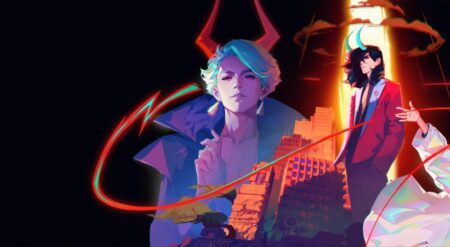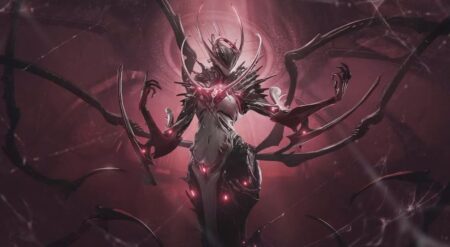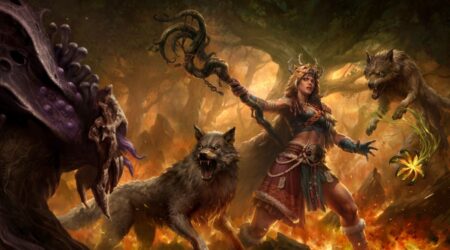“Go under it, go over it, I don’t care, but you’re going to go through it.” That’s what my mom has always told me. Resiliency is a key part of who I am and who I was raised to be. My grandparents were migrant workers, my mom worked multiple jobs, through sickness and beyond. But no matter the obstacle, they succeeded in bringing me to the point I am at today. That toughness is my inheritance. And with that resiliency, comes a specific way of viewing the world, one where you get the work done first and cry second. Seeing that resiliency captured on-screen verbally and through action wasn’t something I thought I’d get out of DC’s latest film, yet, I did. The core of Blue Beetle is Latino resiliency, Mexican resiliency, and how we bend and don’t break.
I got the chance to talk with the director Ángel Manuel Soto about Blue Beetle, keeping Jaime Reyes’ latinidad, the fact that you can’t hide anything from Latina moms, and how he and writer Gareth Dunnet-Alcocer worked to ensure that El Paso was still alive inside Palmera City. Joining the heroic ranks of Miles Morales, as one of two titular superheroes in cinema and the first in live-action, Jaime Reyes means a lot to many Tejanos. Ángel Manuel Soto also talks about showcasing Latino identity in Blue Beetle was more about honesty than authenticity and how keeping Latinidad at the center of Jaime was always important.
This interview has been edited for length and clarity.
BUT WHY THO: I saw Blue Beetle last night and one of my favorite things was Jaime’s story in this film really pushes back on the assumption that heroes have to be alone and that they can’t have everybody kind of in on their secret. Can you talk a little bit about the importance of familía and how that propels his journey?
ÁNGEL MANUEL SOTO: I think it all started with a little bit of a joke. Trying to find a fresh take on the transformation process. Gareth Dunnet-Alcocer, who’s from Queretaro, Mexico, he came with a phrase that I loved, which is like, “Good luck keeping a secret from a Latina mom.” So right off the bat, it was like, the family is in on it. Because at the end of the day, you’re still Cabezon, right? We’re still going to bully you, it doesn’t matter how much world you’re saving, right? Like, my mom is my biggest bully.
We wanted to hone into the fact that the family is there from the beginning. But at the same time, we really wanted to create a film that in itself is that presentation card of Jaime Reyes to the world. It is the first act of a bigger saga. It introduces him to the whole DC Universe in a way that you don’t have to go back to him, you know, where he comes from, you know, his family. And by doing so, we really wanted to make a love letter to the people that came before us and the legacy they left, and the sacrifices they made for us to be where we are.
[Blue Beetle] is a love letter to our families to the Latinidad (Latino identity) that lives within us. Because there is a superhero inside of all of us. We don’t have to wait for somebody else to save us. We can actually be heroes. And I think that’s something that we can see an experience with his family.
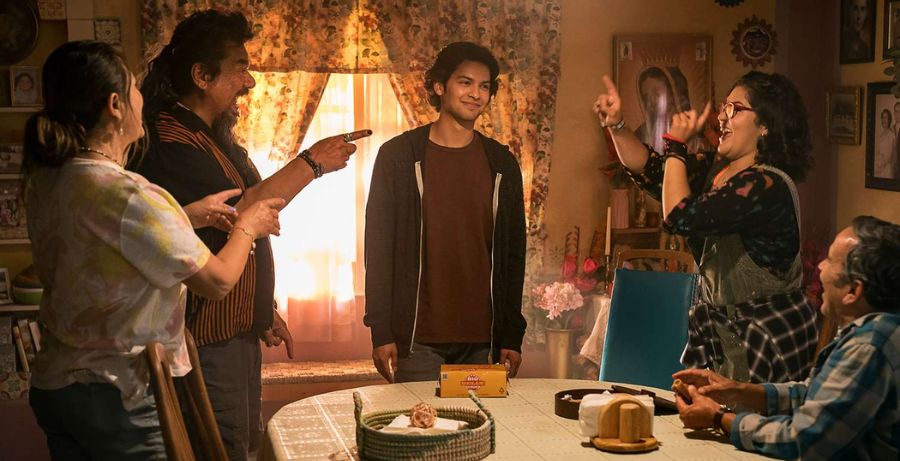
Read our Blue Beetle review here.
BUT WHY THO: I think that comes out really through really well in the last act, where Nana says, “We can cry later. But we need to get this done now.” That’s something my mom has told me on my worst days. What went into shaping that element of “we’re going to give you space to be vulnerable, but you have to be resilient now.” How did you craft that narrative?
ÁNGEL MANUEL SOTO: I’m glad you mentioned that. Like, we were literally being just honest. We didn’t we’re not trying to craft anything, we’re like, “This is our experience.” I watch so many movies where everybody goes into battle, they lose so many people, they win the war, and everybody’s celebrating as if they never lost anybody that they cared for.
[Latinos] grieve differently. We cry differently. We celebrate differently. Our relationship with death is very different than the relationship that the US has with death. And we wanted [Blue Beetle] to be simply and authentically ourselves.
We are a history of resilience. We are a history of connection. And we wanted to celebrate that in a way that felt authentic, and the only way that we could celebrate it is by being ourselves in the midst of certain situations. And like you said, like, sure, it is sad. We’ll have time to cry, but we cannot wallow in the losses because we’re not done.
That legacy of resilience is something that we experienced firsthand. During the aftermath of Hurricane Maria, when we were told that somebody from outside could save us, only to find out that we only have to rely on ourselves to be saved. So by doing so, by doing that resilience, we were able to rebuild cities and rebuild communities. Then we were able to, say “Okay, now we cry, right?”
I think like being embracing vulnerability is something that is a superpower that toxic masculinity tries to shake away because they consider it a weakness. I disagree [with that idea], and I want to make a testament with [Blue Beetle].
BUT WHY THO: I know the marketing for some, left them a little worried, especially the Tejanos, that the Texas and the Mexican part of Jaime may be kind of stripped out. But that’s not the case. We have him in a new city, but he’s still a Mexican kid. How did you come up with introducing that in an authentic way but still holding him in a city and a new surrounding?
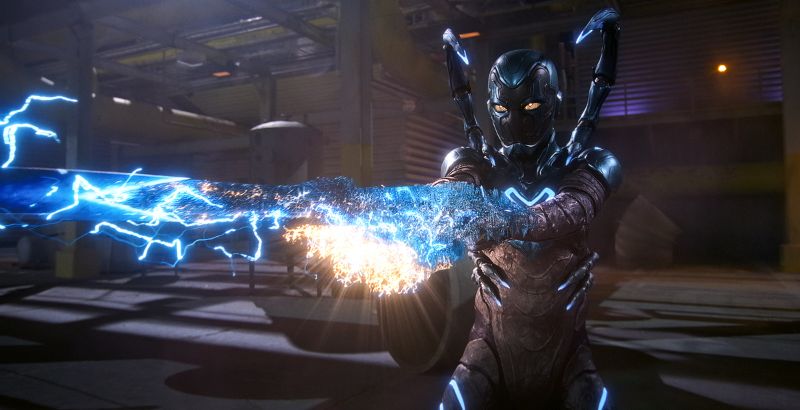
ÁNGEL MANUEL SOTO: I have to give credit a lot to the writer to the actors themselves. One thing that I think history has taught us, specifically with the Latino community, is that in the US, every Latino is an immigrant. They have left their countries, they have left where they came from. And they come to the city, some of them in order to be citizens, have to literally deny where they come from, embrace a new culture, and pledge allegiance to a new flag. Still, we bring home with us.
At first, it was like, “oh, man, how I want to do right by El Paso.” I know what it is like to take something that belongs to you—I’m for Puerto Rico, we know what that is. But we were like, You know what, but at the end of the day, like my Nuyorican family, or like a lot of like Chicano families or people that are immigrating, they take their culture with them.
You might have taken the Reyes out of El Paso. But El Paso stays with them. The same thing that speaks to our heritage, right? Our Latinidad, they’ve tried very hard for us to leave it back there, but it’s just inevitable. We wanted to honor that with this film.
I’m glad that you mentioned that because there’s nothing to fear. Part of my rule with DC was like, you tell me how big the explosives are gonna be as long as you don’t mess with our Latinidad and they respected that.
Blue Beetle stars a primarily Latino cast with Xolo Maridueña, Bruna Marquezine, Raoul Max Trujillo, Becky G, Harvey Guillén, George Lopez, Adriana Barraza, Belissa Escobedo, Damián Alcázar, Elpidia Carrillo, and Susan Sarandon. In the film, an alien scarab chooses college graduate Jaime Reyes to be its symbiotic host, bestowing the teenager with a suit of armor that’s capable of extraordinary and unpredictable powers, forever changing his destiny as he becomes the superhero known as Blue Beetle.
Blue Beetle is playing exclusively in theaters nationwide August 18, 2023.
Blue Beetle Director Ángel Manuel Soto talks Latino Resiliency
Kate Sánchez, Co-founder and EIC of But Why Tho?, spoke with Director Ángel Manuel Soto ahead of the highlight anticipated release of Blue Beetle which will see DC’s first live-action Latino superhero hit the big screen. You can find Kate’s review of the film at https://butwhytho.net/.

